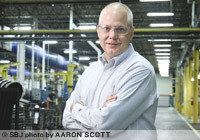State officials want business owners in the Ozarks to know that there are more than 60 incentives available in Missouri to those willing to hire or expand their services. And many, it seems, have not only received that message, they’re acting on it.
Some recent examples of companies utilizing tax credits and incentives are:
• Springfield-based Proformance Powertrain Products. Through the Missouri Department of Economic Development, Proformance, a subsidiary of Chicago-based LKQ Corp., plans to expand its engine remanufacturing production facility at 2720 N. Airport Commerce Ave. and add 131 jobs to its work force. It expects to invest $1.7 million in the local economy and qualified for $400,000 in tax credits through the DED-administered Quality Jobs program.
• Food-service distributor Roma of Springfield. The company, which is owned by Richmond, Va.-based Performance Food Group, qualified for more than $800,000 in tax credits to help fund its plans to add 35,000 square feet to its 80,000-square-foot facility in west Springfield and invest about $5.2 million in capital during the next five years. The company also plans to hire for 50 positions.
• American Products LLC. The Springfield-based company is expected to add 95 jobs and invest $2.6 million in the local economy with the help of $214,900 in Enhanced Enterprise Zone tax credits during the next five years, and energy and sales tax exemptions.
DED Director of Communications John Fougere said the department offers 35 programs at
www.ded.mo.gov to assist businesses and organizations looking to develop, expand or hire.
“We believe that the targeted and prudent use of state tax incentives can be a powerful catalyst to create new jobs and boost new capital investment in the state,” Fougere said.
He said two of the more popular programs in southwest Missouri and across the state are the Quality Jobs Program and the use of EEZs by municipalities.
Fougere said there are 196 companies participating in the Quality Jobs Program and 104 EEZs in the state. Those zones allow companies that invest in distressed areas where jobs are declining and unemployment is rising to receive tax credits, while the Quality Jobs Program rewards companies who hire employees who make above the average county salary – which is $33,924 in Greene County. Qualifying companies must offer health insurance and pay at least 50 percent of premiums for Missouri employees.
Fougere pointed to Internet discount-travel site Expedia’s November ribbon-cutting for its operations center at the former Springfield-Branson National Airport’s terminal as an example of how companies can take advantage of incentives.
The company, which signed a five-year lease on the 59,000-square-foot building last year and pledged to add 500 jobs to the area, qualified for $5.8 million in tax credits through the Quality Jobs Program.
Rita Needham, executive director of the Missouri Association of Manufacturers, said she has seen an uptick in hiring the last year among southwest Missouri manufacturers. However, with the average Missouri manufacturer employing between 30 and 40, Needham said too many state incentives were geared toward larger businesses.
Audrey Spalding, a policy analyst for public policy think tank Show-Me Institute, takes tax credit criticism further, noting government incentives often only promote certain types of businesses.
“How do you identify correctly the right industries to encourage?” she asked. “Tax credits are effectively help from the state. So, why does it make sense for the state to help some industries and not others?”
She said the Quality Jobs and EEZ programs, and others more broadly written to a variety of businesses, can offer benefits, but “the devil is in the details.” Because tax credits are exclusionary by nature, Spalding said narrowly defined programs such as the Wine and Grape Tax Credit can create competitive disadvantages.
Spalding, whose employer promotes free-market solutions in Missouri, also pointed to a September 2010 state audit report that concluded the DED does not adequately verify claims of businesses seeking tax credits tied to EEZs, making it difficult to determine if such credits are an effective use of state resources.
As an employee of a company benefiting from multiple state tax credits, Tom Hilmes supports government incentive programs.
The general manager of CNH Reman said officials at the Springfield Area Chamber of Commerce and Missouri Enterprise advised his company about available incentives.
“If you own a small business and you’re trying to grow it, you’re crazy if you don’t talk to these people,” he said.
Earlier this year, CNH purchased the former Aaron’s Automotive plant in west Springfield for an undisclosed amount and has made more than $1 million in improvements to the 260,000-square-foot building, while hiring 45 employees with the help of roughly $75,000 in incentives.
CNH secured lighting tax credits, and according to the company’s cost analysis, the lights will pay for themselves in reduced energy bills within 13 months.
“We have upgraded our lights to the latest style energy-efficient lights, which actually work better, and in a year, they’ll be free,” Hilmes said.
Activity at staffing agency Penmac Inc. echoes the subtle rebound in manufacturing employment that MAM’s Needham identified.
About 85 percent of Penmac’s 550 business clients are manufacturers, and President Paula Adams said the staffing firm’s net income increased by 39 percent in 2010. First-quarter 2011 was its most profitable on record, she said, declining to provide revenue figures.
“We’re sort of a barometer, I think, to the manufacturing world. We are usually the first to go when the economy is seeing a lull because you’re temporary or short-term workers are the ones that would typically go first before you’d lay off any permanent staff,” Adams said. “Then when the economy starts rebounding, we are usually the first to come back because they’ll use us as that bridge, or that gap, to start to rebuild their work force.”[[In-content Ad]]
